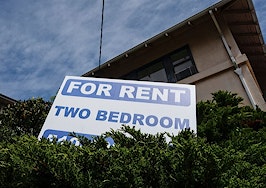September 1 has arrived, and more than 100 million Americans living in rentals have to pay rent without any supplemental aid, despite the fact that the coronavirus pandemic rages on.
The federal moratorium on evictions expired at the end of July, and consensus on a second federal relief package continues to be elusive. Without further action soon, the brewing financial crisis has the potential to heavily burden American renters.
During the first week of August, 22 percent of renters had not made a rent payment, according to a survey by Apartment List. According to data from Zillow, that figure was largely the same during the first week in July, with 22.6 percent of apartment households in the U.S. not paying rent, a number up from 19.2 percent during the first week of June, and higher than any other month since March.
As of July 13, the share of renters who had not yet paid rent was 12.4 percent, up from 9.9 percent the same time the year before.
Recent estimates have shown that about half of all U.S. households have lost income during the pandemic, which means government aid has likely stymied shares of unpaid rent from rising to even greater heights. And although President Trump recently issued executive orders limiting evictions (essentially calling on the Secretary of Health and Human Services and the director of the Centers for Disease Control and Prevention to determine whether or not a cease of evictions would be “reasonably necessary”) and requesting states to provide further unemployment benefits, the orders fall short of full, concrete relief, and put an extra burden on individual states — a burden many of which have said they cannot meet.

Courtesy of Zillow
Rent payments have held up relatively well, so far

Joshua Clark | Zillow
“Renters were disproportionately affected by the pandemic,” Joshua Clark, a Zillow economist, told Inman. “They tended to be in jobs that had to be in close contact, and therefore, [were] affected by the different changes in the laws. So, you have this very vulnerable group that’s receiving a lot of fiscal support, in the $1,200 check initially, plus the extra $600 for every month. And now, we’ve been without a deal for a while. So even if a deal comes through, there’s going to be a gap, and that’s going to be affecting renters.”
Although there have certainly been declines in paid rent during the pandemic, as noted by the Zillow metrics above, a remarkable number of renters have continued to make rent payments. As of August 13, 86.9 percent of apartment households had made a full or partial rent payment, according to the National Multifamily Housing Council’s Rent Payment Tracker. That number was only down by two percentage points from the same period in 2019, and down slightly from the 87.6 percent who had made payments by July 13.
Clark said he believes the fact that rental payments continued for so many households is because of the stimulus payment. “I was very surprised,” he said. “I think that speaks to how good the stimulus has been.”
Brian Miller, director of marketing at Berger Rental Communities, also noted that his company hasn’t seen ballooning rates of delinquency among residents as of yet.
“It’s not far off from where we typically are,” Miller told Inman.
Is a wave of mass evictions likely? Maybe not
Now that there are no firm stimulus payments in place, and flu season is approaching — potentially priming the country for a more precarious public health situation — increased missed rent payments could set off a chain reaction with wide-reaching economic effects.
“I am starting to worry about landlords having to go into forbearance,” Clark said. “That’s really what the scary thing is. If we start getting into problems where mortgages start defaulting, we only really have to look to the last crisis to see that when financial difficulties occur, they metastasize to the rest of the economy very quickly. If people are defaulting and there are foreclosures, the damage is incredible, and the damage can spread incredibly quickly.”
According to Zillow, over half of the income acquired from the typical rental unit goes toward fixed costs of maintaining the unit, including mortgage payments (even if some owners currently have a forbearance agreement in place), property taxes, maintenance, insurance and capital improvements. However, that figure does not account for other associated costs many landlords incur, like staff wages, business taxes, legal and accounting services and landscaping.
After all of those expenses, the average annual return on investment for a rental unit is currently 6.4 percent, a significant decline from the average of 13.3 percent in 2015.
Some have speculated that the lack of financial stimulus will inevitably lead to a mass wave of renter evictions and/or landlord mortgage defaults. So much so, that the hashtag #evictiontsunami has been trending on Twitter. However, economists like Clark and others argue that the near future for landlords and renters will likely be much less dramatic.
“Everyone’s watching for this cliff to come when all Hell’s going to break loose, and it doesn’t appear that it’s happened

Dr. Brian Kench | University of New Haven
yet,” Dr. Brian Kench, dean of the Pompea College of Business at the University of New Haven and expert in behavioral and experimental economics, told Inman. “Will some of that happen? Sure. Mass? Unlikely. Unless there’s a tailspin in the economy, but I think if you were to observe that in the economy, the political actors would probably step back in and stop it.”
Clark explained that, with so many people feeling the uncertainty of the current moment, it’s unclear that landlords would have much to gain by going through the trouble of evicting tenants. Furthermore, many of them have enough equity built up on their properties where they would likely be able to go into forbearance on their mortgage payments for a period, if it came to that.
Clark is “skeptical of the narrative” that is fueling the #evictiontsunami Twitter chatter. He explained that if the economy goes south and people can’t pay rent and they are forced to leave their homes, landlords “need to find new people to fill up those homes.”
So in order to evict someone, he noted, a landlord must “be more confident right now in finding somebody to fill that home,” and that’s what gives him pause. “Everybody’s hurting,” said Clark. “As a landlord, what gives me confidence that I’ll be able to find somebody out there that’s going to be able to do that?”
Before the scenario reaches that breaking point, Kench suspects that landlords and renters would do their best to meet halfway.
“I think you are observing a lot of economic behavior, in terms of the landlords, whether those be large organizations or the small mom-and-pop landlord, changing policy and creating different incentives, different ways of paying,” said Kench. “So I think all those moves that are being made are helping, so you’re not seeing the crisis actually unfold.”
How renters and landlords are meeting halfway
The experience of Ashley Keefe, a real estate agent with Dream Town Realty in Chicago who also manages some rental properties and those of a few clients, speaks to the notion of direct landlord to tenant compromise.

Ashley Keefe | Dream Town Realty
Fortunately, all of Keefe’s own tenants happen to be essential workers — a fact she says, “was just luck” — who have kept earning a steady income throughout the pandemic. However, a few of her clients’ tenants have had to break their leases because of job insecurity. Keefe said, though, that landlords and tenants were able to work out compromises so that no one party suffered disproportionately.
“Their tenants had reached out to them saying they did need to get out of their leases,” Keefe told Inman, explaining that the landlords worked with the tenants to find a solution. “It wasn’t ‘No, you must keep your lease.’ It was more, ‘Let’s try to find a way to work this stuff out.'”
She added that they’ve been able to re-rent most of the vacated apartments. “There’s one that I’ve been having trouble with, but the tenants actually agreed to pay until we did get it leased again,” said Keefe. “So no one’s been in a real pinch. I think honestly it’s just about being super open and transparent and swinging with the punches.”
The tenant Keefe is referencing is Diana Cardona, a restaurant worker who lived in Chicago with her son and husband, who works in the sheet metal industry. Cardona told Inman that her work hours were severely cut as a result of the pandemic, from working four days a week to one or two days per week. Meanwhile, her husband went from working up to six days a week plus overtime to four days a week. With the cut to their incomes, Cardona and her husband were afraid they’d soon have to pull from their savings in order to make rent. Instead, they made the decision to break their lease and move out of state to live with family.
“Three months ago, we were not [having trouble paying rent],” Cardona told Inman. “But now, we are afraid we might have to get money from our savings. We decided to move to Indiana, and have someone else rent the apartment. We’ve been afraid, in the future, of not being able to pay rent, since my husband is the head of the household.”
For now, Cardona told Inman she and her husband plan to try and save money while living with her in-laws, with the hope that they might be able to buy a house in a year or so if the economy improves. When they do buy, she said they’ll look in Indiana, rather than return to Chicago.
“We’re looking in Indiana because of space. In consideration [of] COVID, we feel safer living outside of a big city,” Cardona said. “Don’t take me wrong — we love the city; it’s just a hard time right now.”

Brian Miller | Berger Rental Communities
Miller said that Berger Rental Communities put several measures in place early on — like other multifamily housing companies — in order to ensure that residents had options during this uncertain time. Those measures included offering rent payment plans, allowing tenants to use their security deposit toward rent (with no expectation of repaying the deposit) and allowing tenants to break their lease at any time and just pay what rent they owed up to that point.
And, although Miller noted that missed rent payments are most impactful for his company where they begin — between landlord and renter — he said the organization also heavily considered their ripple effects.
“We know that partners like roofers or electricians or whoever it might be that’s supporting our property, they count on us operating to a certain level,” Miller said. “And if we didn’t do those things, then you have another wave of people that also have rent and mortgage payments themselves who are going to be impacted and the cycle starts again. So we thought it was crucial to get this right.”













